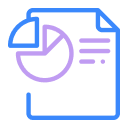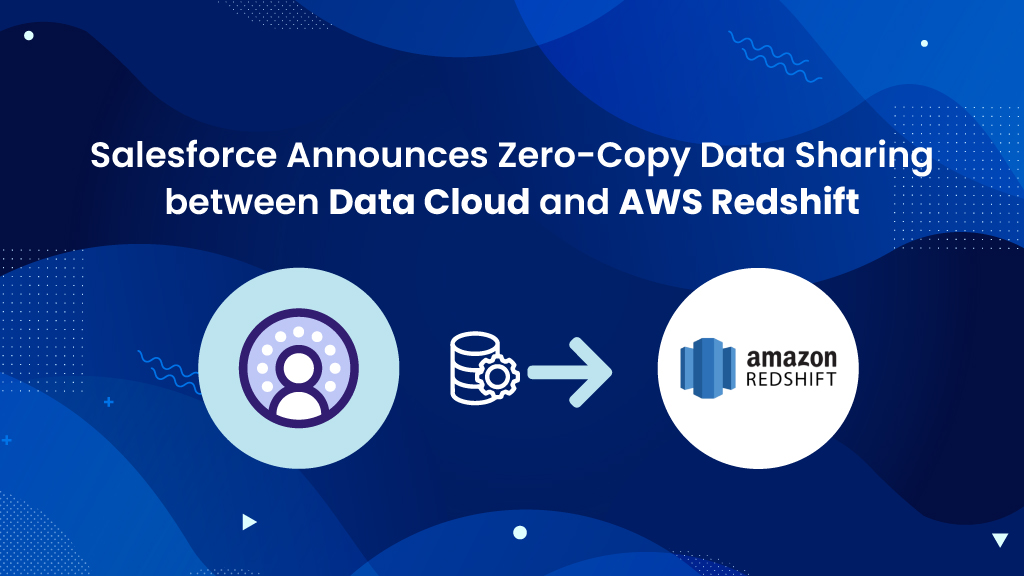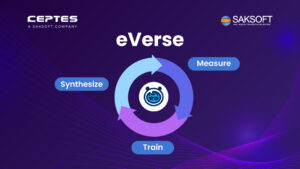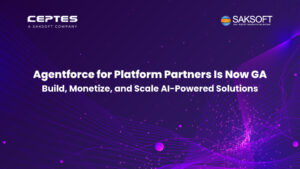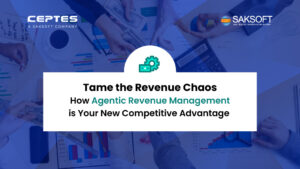This innovative integration is set to change the game by allowing bidirectional connectivity between customer data in Salesforce to Redshift—without the need to copy or move data. Imagine a scenario where your Salesforce Data Cloud is filled with valuable customer insights, and on the other side, you have Amazon Redshift, a powerful data warehouse ready to perform analytics at scale.
Now, seamlessly share data between these two platforms without the hassle of copying, moving, or worrying about data being out of sync? Enter Zero-Copy Data Sharing.
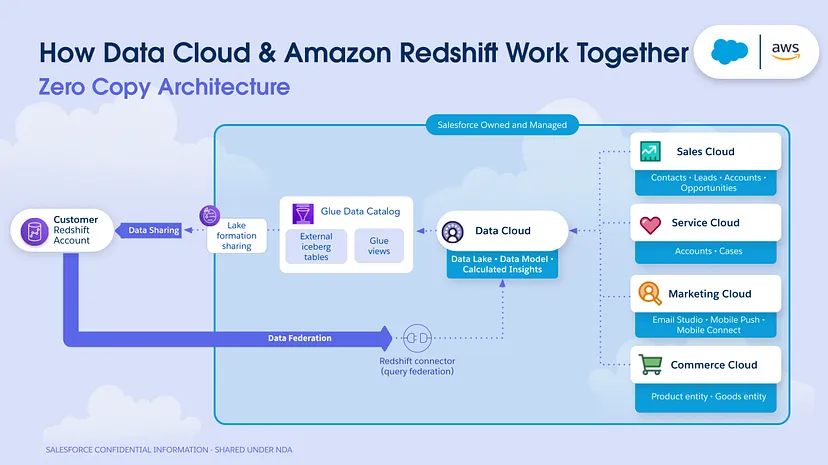
What is Zero-Copy Data Sharing?
Traditionally, sharing data between systems like Salesforce Data Cloud and Amazon Redshift would require you to copy the data from one place to another, which can be time-consuming, costly and full of security risks. But with Zero-Copy Data Sharing, that’s no longer the case.
Imagine you have a treasure trove of customer data stored in a separate database. With Zero Copy, you can access data from other places without having to move it. You can connect directly to the data and use it instantly, so you always have the latest information. This makes it easier to give your customers the best possible experience.
1. BYOL Data Federation (data-in):
With a user-friendly, point-and-click interface, you can easily connect to data stored in Amazon Redshift. You can create External Data Lake Objects and integrate them directly into the Salesforce Customer 360 Data Model enhancing Data Cloud capabilities and customer experiences on the Einstein 1 Platform.
2. BYOL Data Sharing (data-out):
Effortlessly share Salesforce data with Amazon Redshift to seamlessly access and analyze Salesforce data within Amazon Redshift, maximizing the value of your existing data investments while maintaining data security and integrity.
Benefits of Zero-Copy Integration:
With Zero-Copy integration in Data Cloud, Salesforce has built a strong foundation using open standards like Iceberg table format and SQL. Here’s how it ensures that the data remains consistent, secure, and instantly available for analysis:
1. Direct Connection:
Instead of copying data, Zero-Copy Data Sharing establishes a direct connection between Salesforce Data Cloud and Amazon Redshift.
2. Real-Time Access:
This connection allows Amazon Redshift to access the most up-to-date data directly from Salesforce Data Cloud in real time.
3. Data Sharing:
You can specify which data sets you want to share, ensuring that only the necessary information is accessed by Amazon Redshift.
4. Seamless Integration:
The data remains in Salesforce Data Cloud, but you can run analytics and queries in Amazon Redshift as if the data were stored there, without any physical duplication.
Overcoming ETL Challenges with Zero-Copy Integration:
In traditional data sharing, the Extract, Transform, Load (ETL) process is often complex and requires skilled personnel to build and maintain intricate pipelines. The complexity often leads to higher operational cost, security risks and compliance as the data is being frequently moved or copied.
Also, ETL can be cumbersome, slow, and prone to errors. You often have to deal with data inconsistencies, latency issues, and the complexity of managing multiple copies of data.
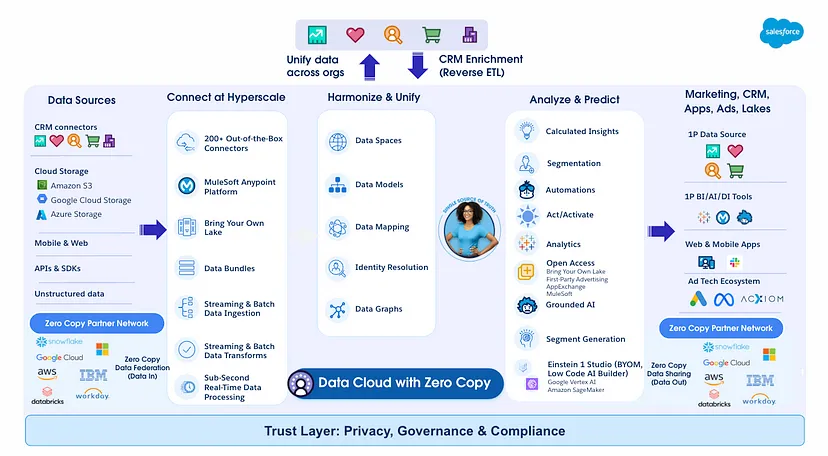
1. No More Data Duplication:
Since there’s no need to create multiple copies of data, you avoid the headaches of managing data consistency across different systems.
2. Reduced Latency:
Real-time access means you don’t have to wait for data to be copied and processed before you can analyze it.
3. Simplified Data Pipelines:
By cutting out the ETL process, you simplify your data management and analytics workflows, making it easier to get insights quickly.
4. More Business Value:
Zero-copy integration connects your data directly to actionable insights, enabling your business to quickly respond to market shifts and customer needs.
Benefits for Businesses:
The benefits of Zero-Copy Data Sharing between Salesforce Data Cloud and Amazon Redshift are substantial:
1. Faster Decision-Making:
With real-time data access, businesses can make informed decisions faster, without waiting for data to be copied and processed.
2. Cost Savings:
By eliminating the need to copy data, you save on storage costs and reduce the resources required to manage data pipelines.
3. Improved Data Consistency:
With a single source of truth, you reduce the risk of discrepancies between different data sets, leading to more accurate analysis.
4. Enhanced Security:
Keeping data in one place reduces the risk of data breaches during transfer, ensuring that your customer information remains secure.
5. Scalability:
As your data grows, Zero-Copy Data Sharing allows you to scale your analytics efforts without the need for complex reconfigurations.
Wrapping Up:
The introduction of Zero-Copy Data Sharing between Salesforce Data Cloud and Amazon Redshift Data Analysts can determine customer churn by accessing Salesforce Data Cloud data shares in Amazon Redshift. By eliminating the need for ETL processes along with real-time access to data, businesses can now achieve faster, more accurate insights at a lower cost.
By combining Salesforce Data Cloud’s Zero Copy capabilities with a 360-degree view of customers, teams can gain deeper insights, personalize interactions, and deliver exceptional value at every touchpoint.
FAQs:
1. How does Salesforce's Data Cloud integrate with AWS Redshift?
Salesforce’s Data Cloud integrates with AWS Redshift through zero-copy data sharing, allowing direct access to real-time data in AWS Redshift without needing data duplication.
2. Is zero-copy data sharing secure?
Yes, it enhances security by eliminating the need for duplicate copies, reducing the risk of data exposure and minimizing storage vulnerabilities.
3. Does zero-copy data sharing improve data analysis?
Yes, it accelerates data analysis by allowing real-time access to data in its original storage location, enhancing performance and insights.
4.How does this feature impact data synchronization?
It allows seamless, real-time data access, reducing synchronization delays and ensuring all platforms access the latest data.
We are always here to help.

Nilamani Das
Nilamani is a thought leader who champions the integration of AI, Data, CRM and Trust to craft impactful marketing strategies. He carries 25+ years of expertise in the technology industry with expertise in Go-to-Market Strategy, Marketing, Digital Transformation, Vision Development and Business Innovation.










